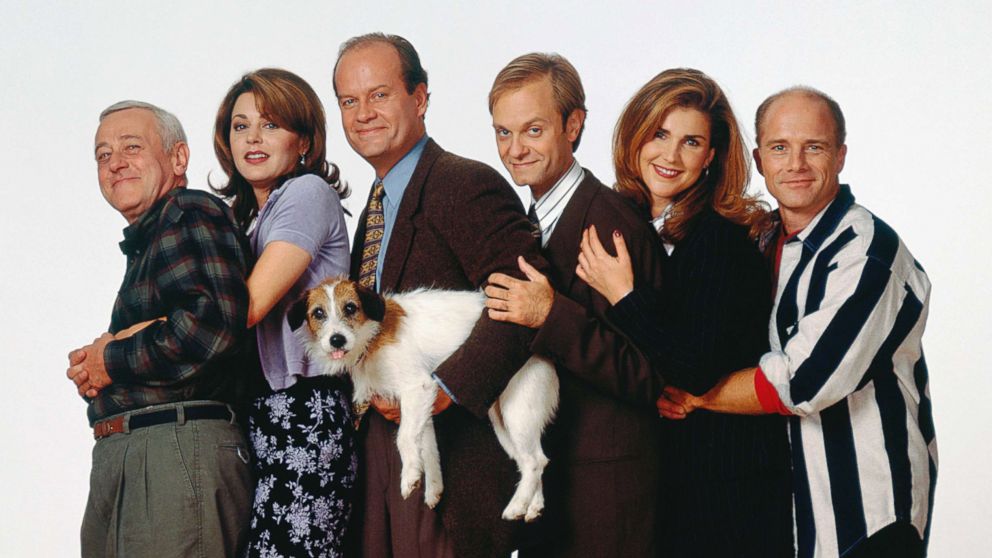By Shane Ryan
July 29, 2019
I’m 36 years old, which means I was 10 when Frasier first came on the air and 21 when it ended in 2004. I spent those formative years doing Millennial-type things, such as eating avocado toast, sneering, and skateboarding while neon lights sizzled in the air around me. And sure, I caught the odd Frasier episode on syndication here and there, but I had no concept of what the show was really like. My impression, vaguely held, was that at least half of the episodes revolved around Frasier having two dates at the same time in the same restaurant, and excusing himself to go to the “bathroom” frequently as he rushed back and forth between tables, trying to keep the women from suspecting that anything was amiss. That, no joke, is what I thought Frasier was all about. I would have called it “wacky.”
Why did I think this? Did I actually see that scene play out, at some point? Did I dream it?
No clue.
Turns out, I was very wrong. I have now watched the entire first season of
Frasier on
Netflix, 24 episodes strong, and I can tell you that the restaurant caper of my imagination is not the plot of a single episode. Maybe it comes up later, but I doubt it. The truth of this show has been revealed to me, and I am furious:
Why didn’t any of you tell me it was so staggeringly good? You people, who are supposed to be my friends and family, let me go almost half of a standard male American lifetime completely IGNORANT of a comedic masterpiece.
Because that’s what is! Frasier is an absolute gem, the jokes are stingers, and the storytelling is mind-blowing when you consider the limitations of the 22-minute laugh track sitcom. The writers were clearly virtuosos, to the point that they even manage to tug at my frayed Millennial heartstrings. Point is, holy shit, Frasier really holds up.
I’ll get to the funny stuff, but first I want to talk about the heartstrings. One thing I absolutely hate about old sitcoms is the cheeseball morality you have to sit through, which is presented with all the subtlety of an After School Special written by
Aaron Sorkin. That’s why
Seinfeld was so great—it didn’t bother trying to uplift anyone. It was the kingdom of the selfish. But
Frasier sometimes
does bother with it, and what’s wild is that it’s actually good and meaningful.
Let me give you an example: In the Season One finale, called “My Coffee with Niles,” most of the drama hinges on a question Niles presents to Frasier early in the episode: “Are you happy?” It takes Frasier by surprise, and he turns it around on his younger brother, who’s ready with a quick response: “No, but we’re not talking about me.” Frasier won’t let it go, presses Niles as to why. The speech that follows doesn’t seem to belong in a 1990s sitcom:
“I was watching PBS the other night in my study and they were showing this documentary on the Great Depression. Vintage Steinbeck – desperately poor people escaping the Dust Bowl, their meager possessions strapped to rickety old trucks heading to what they thought was their salvation. Then there was this scene with this scruffy boy being handed a brand-new pair of shoes by the Salvation Army. Frasier, if you saw the look on that boy’s face…it was a look of pure and utter happiness. I have never experienced that kind of happiness, not in my whole life.”
Shit, man!
That one really got to me, and while they tried to take the air out of the moment with a joke about Niles’ $400 shoes in the next line, it wasn’t possible—Niles’ words were profound in a way that I’ve never seen in that format before, and they express so much about modern life and the nature of struggle with so few words. It was heartbreaking, actually, and a good reminder that David Hyde Pierce is more than just a brilliant comedic actor.
I’ve thought about that monologue ever since, but it’s not the only example. Throughout the first season, Frasier is constantly at odds with his father Martin, a retired cop who lives with him after a bullet to the hip ended his career. Niles is in a loveless marriage with his hypersensitive waif Maris (who, as Paste’s Keri Lumm pointed out, is the most inexpensive character of all-time, since we never see her), and is falling in love with Daphne, Martin’s live-in caretaker. Frasier’s radio producer, Roz, can’t find love, and his co-worker Bulldog is a wannabe alpha male whose insecurities are all the more painful when they shine through. And yes, everyone takes their shots at each other, and in some cases they are extremely hard shots, but these characters are more than two-dimensional punchline vehicles. Their problems and neuroses and heartaches are always treated with respect, and—warning, this will sound like some 20-year-old discovering jazz for the first time—it changed my opinion about exactly how profound a laugh track sitcom can be, at its best.
Oh, and it’s funny as hell. I also didn’t expect that. I have to admit, my own personal prejudice was that really funny TV shows, by which I mean the kind that can make a depraved idiot like me laugh out loud, started with
Seinfeld but mostly came after the turn of the century. This is a kind of blind snobbery, I get that, and I invite you to judge away. But I’m saying, I did not expect
Frasier.
I’m about to hit you with a couple examples now, though I would issue the disclaimer that nothing looks quite as funny on paper, and a lot of the humor is wrapped up in the performances.
Anyway, the line I found the funniest came when Niles joined Frasier on his radio show to speak on the theme of siblings. A woman called in and remembered the time she got a terrible haircut, was forced to shave her head, and expected her sisters to mock her ruthlessly. Instead, they shaved their own heads in solidarity. The Crane brothers are moved, and it leads to this exchange:
Frasier: Niles, I would shave my head for you.
Niles: A gesture which becomes less significant with each passing year.
Have you ever heard a better bald joke??!! Have you???
At another point, after Frasier agrees to go on a motor home road trip with Martin, he begins to have regrets. Niles tells him to back out, but Frasier knows he can’t:
Frasier: Oh, I can’t do that. He’s counting on this trip too much. It was his dream. He was going to go on this trip with mom.
Niles: Yes, but she lucked out and died.
There are great one-liners too, emerging in particular each time Niles refers to one of the therapy groups he runs. For instance:
“I’m conducting a seminar on multiple personalities and it takes forever to fill out the name tags.”
“I’m due at my sexual addiction group, and I don’t like to leave them alone too long.”
“I have my ‘fear of abandonment’ workshop today and I’ve already been a no-show twice.”
Frasier: I filled in for you when you were too sick to meet with your “Fear of Intimacy” group!
Niles: I wasn’t sick. They were just getting too close.
And the performances! They’re all top-notch, but I didn’t quite realize how obscenely funny both Kelsey Grammer and David Hyde Pierce were. Grammer alone is one of those men who can convey six emotions at once using only a single facial expression, and all of them end up being hilarious. And Pierce—who, as you see above, gets many of the best lines—is just magnificent as the prissy, perpetually wounded Niles. That’s not to throw shade on any of the supporting actors, but those two, together, are just a walking (mincing?) tour de force.
Even the conceit of the show is a well-placed joke. Frasier, in my unprofessional opinion, is a godawful shrink. Psychotherapy by radio is already a fraught concept—Niles correctly calls it “psychiatry’s answer to the drive-through window”—but even by that standard, his advice to callers is either dismissive or glib. If you were a fictional character with mental health problems, the only worse shrink you could find is Dr. Hannibal Lecter. And the writers know it, to an extent. Sure, they give Frasier his moments, but they never go easy on the idea that he plies his trade on the radio and cares more about celebrity and status than helping his “patients.”
And, he and Niles are inveterate snobs. One of the most painful episodes came when they took Martin to one of his favorite restaurants, a homey steak joint, and proceeded to mock everything around them until their father left in disgust. It’s not that they lack heart, but unless someone calls them out, they’re totally blind to their own pretensions in ways that can be galling or hysterical, depending on the situation. With Frasier, especially, I found myself going back and forth between wanting to be his friend and wanting to see him get punched.
But it works! Their flaws are not just hinted at, but often exposed, and the process of trying to be good people is not easy for them. There, too, the show excels in its honest treatment of middle-aged, nearly modern men.
There’s also a mandatory warning to convey, re: the era—to enjoy this, you’re going to have look past some problematic material. Niles is always leering at Daphne, or trying to touch her, or trying to get her to touch him. Frasier forces Roz to hug him against her will at one point; Roz also gets slut-shamed by everyone, all the time. The worst moment, though, came when Frasier was deliberating about whether to do a promo for a Chinese restaurant—would it destroy his integrity?—and Bulldog steps in to do the job. He uses the most racist accent ever, and finishes by hitting a gong, all of which could be a commentary on Bulldog himself, at a stretch…except that the laugh track people choose that moment to employ the “breathless laughter followed by ecstatic applause” button. So, you know…judge it for its time, and all that.
For the most part, though, Frasier was well ahead of its time, and that’s why it still hits so hard today. It’s the humor, yes, but it’s also the humanity. There aren’t many shows that can pull them off simultaneously, as in this moment when Frasier recalls waking up on his couch to find his father rubbing his head in a rare gesture of affection:
Niles: Dad?! Did he say anything?
Frasier: Well, he said, “don’t you think it’s time you got a hair cut, you’re starting to look like bozo!” I know he was only covering though. But what do you think?
Niles: Probably wouldn’t hurt to get a trim.
And while the writers clearly mastered the humor, it’s their patience and comfort in the humanity that really makes the show timeless. And ask yourself this: How many sitcoms, for their first ever season finale, would have the courage to hinge the entire episode on that singular, fundamental, and awful question: “Are you happy?”
Shane Ryan is the Politics editor at Paste. Follow him on Twitter here:”https://twitter.com/ShaneRyanHere”.





/cdn.vox-cdn.com/uploads/chorus_image/image/60062503/Screen_Shot_2018_06_13_at_8.33.42_PM.0.png)